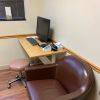How to Keep Your Heart Healthy When You Sit All Day
In today's world, many of us spend long hours sitting at desks, commuting, or relaxing on the couch. While these activities may feel comfortable, prolonged sitting can negatively impact our heart health. In fact, a sedentary lifestyle is now recognized as a major risk factor for heart disease. But don't worry! There are effective strategies you can implement to keep your heart healthy, even if your daily routine involves a lot of sitting. Here's how you can take control of your cardiovascular health.

1. The Impact of Sitting on Heart Health
Sitting for extended periods can lead to poor circulation, increased blood pressure, and elevated cholesterol levels—all of which contribute to an increased risk of heart disease. When you sit, your muscles become inactive, and your metabolism slows down, which can impact your heart's ability to function efficiently. Over time, this sedentary behavior may lead to weight gain, reduced cardiovascular fitness, and a higher likelihood of developing heart-related conditions.
Atlanta Heart Specialists
atlanta heart specialists
4375 Johns Creek Pkwy #350, Suwanee, GA 30024, USA

2. Simple Ways to Improve Heart Health While Sitting
Although sitting for long periods is often unavoidable, there are several simple and effective ways to improve your heart health without leaving your seat. By incorporating a few small changes into your daily routine, you can combat the negative effects of sitting and boost your cardiovascular well-being.
2.1. Take Regular Breaks
One of the easiest and most effective ways to maintain heart health is to take regular breaks from sitting. Aim to stand up and move around for at least 5–10 minutes every hour. Whether it’s stretching, walking to the kitchen, or doing a few quick exercises, taking breaks will improve circulation and reduce the risks associated with prolonged sitting.
2.2. Do Seated Exercises
If standing up frequently is not feasible, consider incorporating seated exercises into your routine. These exercises target different muscle groups and promote blood flow while seated. Some examples include seated leg raises, seated marches, and chair twists. These simple movements can help increase circulation and prevent stiffness and discomfort.
2.3. Try Deep Breathing Exercises
Deep breathing exercises are a great way to reduce stress, lower blood pressure, and improve heart health. Try taking a few minutes each hour to practice deep, slow breathing. Breathe in through your nose for four counts, hold for four, and then exhale slowly through your mouth for four counts. This practice can help relax your body and lower your stress levels, which in turn can have positive effects on your heart.
3. The Importance of Diet for Heart Health
In addition to physical activity, maintaining a heart-healthy diet is crucial when you have a sedentary lifestyle. Consuming the right foods can help lower cholesterol, reduce inflammation, and support overall cardiovascular health.
3.1. Focus on Whole Foods
A heart-healthy diet emphasizes whole, nutrient-dense foods such as fruits, vegetables, whole grains, lean proteins, and healthy fats. These foods are rich in antioxidants, fiber, and essential nutrients that support heart function. Avoid processed foods, trans fats, and excessive sodium, as these can negatively affect your cardiovascular health.
3.2. Increase Omega-3 Fatty Acids
Omega-3 fatty acids are essential for heart health. These healthy fats, found in foods such as fatty fish (salmon, mackerel, sardines), flaxseeds, and walnuts, help reduce inflammation, lower blood pressure, and support healthy cholesterol levels. Consider incorporating omega-3-rich foods into your diet to keep your heart in top condition.
3.3. Stay Hydrated
Drinking enough water is essential for maintaining optimal circulation and overall health. Dehydration can negatively affect your blood volume and circulation, making it harder for your heart to pump blood efficiently. Make sure to drink water throughout the day, especially if you're sitting for long periods.
4. Stress Management for a Healthy Heart
Chronic stress is a significant contributor to heart disease, especially for individuals with sedentary lifestyles. Stress can lead to increased blood pressure, higher heart rates, and higher levels of the hormone cortisol, all of which can strain the heart over time. Managing stress is key to preserving your cardiovascular health.
4.1. Practice Mindfulness and Meditation
Mindfulness and meditation are powerful tools for managing stress. Taking just a few minutes each day to meditate or practice mindfulness techniques can help calm the mind, reduce anxiety, and lower blood pressure. These practices promote a sense of relaxation and well-being, which benefits your heart in the long run.
4.2. Engage in Relaxing Hobbies
Incorporating relaxing hobbies into your routine can help alleviate stress and improve your heart health. Whether it's reading, gardening, knitting, or listening to music, taking time for activities that bring you joy can reduce your overall stress levels and help keep your heart healthy.
5. The Benefits of Regular Physical Activity
While sitting for long periods may be inevitable in some situations, regular physical activity is essential for keeping your heart healthy. Even if you have a desk job or spend a lot of time sitting, it's important to incorporate movement into your day. Exercise has numerous benefits for your heart, including improved circulation, reduced blood pressure, and better cholesterol levels.
5.1. Find Opportunities to Move
Look for opportunities to move throughout your day. Take the stairs instead of the elevator, go for a short walk on your lunch break, or do a quick stretching routine before bed. Any movement is beneficial for your heart and overall health.
5.2. Consider Deskercise
If you have a sedentary job, try incorporating desk exercises (or "deskercise") into your workday. Simple activities like shoulder rolls, neck stretches, and leg lifts can help keep your muscles engaged and promote blood flow throughout the day.
6. When to Seek Professional Advice
If you're concerned about your heart health due to a sedentary lifestyle, or if you're experiencing symptoms such as chest pain, shortness of breath, or dizziness, it's important to consult with a healthcare professional. A doctor can provide personalized advice and recommend lifestyle changes to support heart health.
At HeartCare Hub, we offer valuable resources and services to help you improve your cardiovascular health. Whether you're looking for expert advice, heart-healthy recipes, or tips for managing stress, we're here to support you every step of the way.






















Deborah Heart and Lung Center
deborah heart and lung center
200 Trenton Rd, Browns Mills, NJ 08015, USA